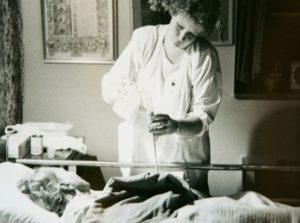The conversation started innocently enough. It was thirty years ago (in an age before cell phones) at the nursing home where I served as chaplain. The sister of one of our patients needed to use a phone. The Assistant Director of Nursing invited her into the office down the hall from the patient’s room. The frail old lady hung up the phone when she got a busy signal (this was also before call waiting and voicemail).

In the quiet, while she waited before dialing again, she told the nursing supervisor, with great sadness, “My sister would never want to be kept alive like this.” “Like this” meant in a nursing home, on a feeding tube, and nonresponsive. The wise and compassionate Assistant Director of Nursing responded, “You know, you can stop the tube feedings if you feel that would have been her wish.”
Over the next days, the patient’s sisters and son met with the doctor and our nursing home care team. The family decided to withdraw the feeding tube and let the patient have a peaceful and natural death — and so it was. But this painful decision – and the patient’s slow, prolonged death – could have been avoided.
It could have been done differently
The lady had a stroke, was unconscious, and couldn’t swallow. The hospital physician said she needed a feeding tube and that was that. What if that doctor had said, “We can try the tube feedings for a little while, say thirty days, and if she doesn’t improve, we can stop the artificial feeding and let her die peacefully.” So much suffering could have been avoided if a “time-limited trial” of the feeding tube had been offered to the family.
My mind went back to this experience after recently reading a great piece by Paula Span in The New York Times, “I Need to Know I Tried” in her ongoing series “The New Old Age.” Reporting on a research study conducted in Los Angeles, she explains how time-limited trials offered to families of critically ill I.C.U. patients had many benefits. The length of stay in the I.C.U. was shortened, fewer patients had prolonged deaths, and the families felt better about their decision-making.
This new research confirms what I have known all along. In my view, there is no downside to a time-limited trial.





